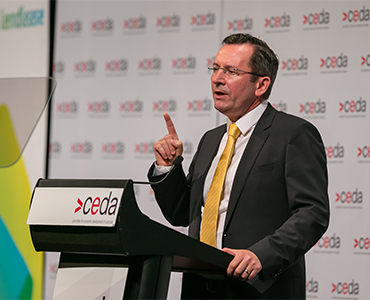Explore our Climate and Energy Hub
06/12/2016

Mr McGowan provided an assessment of the State’s current finances, saying that, “State debt under this Government blew out to $27.3 billion last financial year — a rise of 658 per cent. It is predicted to jump to $40 billion in 2019-20.”
“There is no quick fix. There are no magic bullets to fix the State’s finances,” he said.
“Aside from changing the Government, the only way to fix the finances is to change the culture.”
Mr McGowan used the opportunity speaking at the CEDA event Opposition’s election platform to announce his party’s plan to link the salaries of senior public service Directors General and Chief Executive Officers to measured performance.
He explained that Labor proposed introducing a maximum of 20 Key Performance Indicators – KPIs – that senior public service figures would have to meet.
“And if those KPls are not met,” Mr McGowan said, “Then the Department or Agency heads face the prospect of a 20 per cent cut to their annual pay.”
“For this to have value, the KPls need to be linked to issues that matter to people and that the Government has a role in providing.
“For instance, potential KPls could be increasing the number of local jobs created on government projects including METRONET; reducing the use of methamphetamines; reducing the incidence of family and domestic violence; or attracting more overseas tourists and students – to name a few examples.
“Under the plan, the final KPIs will be determined by Cabinet and will be assessed by the Director General of the Department of Premier and Cabinet and the Public Sector Commissioner.
“Ongoing assessment of performance and the monitoring of the KPls will also include the contribution of key industry bodies. Consulting with industry should be a key part in the overall assessment process.
“These KPls will not only measure the effectiveness of government, it will define my success as Premier if elected.”
Mr McGowan also said that a Labor Government planned to reduce the number of Senior Executive Service positions by 20 per cent, calling this a “real saving in recurrent costs”.
“It has to be noted that since coming to Government, the Liberal and National Parties have increased the number of Senior Executive Service members, or SES, in the public service from 374 to as high as 514.
“That is a massive increase of 36 per cent. And it is unsustainable.
“I'd like to call it, the 20-20-20 plan. 20 KPls, 20 per cent salary linked; and a 20 per cent cut to SES.
“And its aim is simple; break down the bureaucratic silos to deliver real and more efficient outcomes in vital public services.”
Mr McGowan noted his concern with silos in the public sector, saying that the culture of government agencies needed to change.
“It requires better co-ordination and integration of service delivery across multiple government agencies. In other words, key people from different departments and agencies have to actually talk to one another to solve serious problems. Novel, I know.
“Not only talk to one another but also take responsibility. At the moment, this doesn't appear to be happening.”
